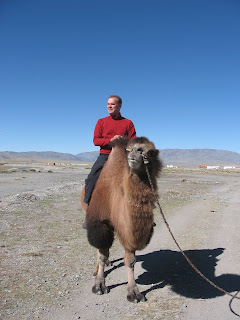Today we got to the credit union early. We spent sometime with the lender first thing in the morning; sharing with each other loan origination practices. The credit union's delinquency ratios are good, even by our standards. Afterwards I take sometime to finalize my final report and recommendations. By mid day we debriefed with the CEO and the accountant as to our recommendations. It can be a delicate situation: wanting to do the best for the credit union, it members, and community, while not offending either from a cultural perspective or expertise.
By three o'clock in the day we leave for a national park to the west and a lake, Altai tavan bogd national park and khoton nuur. It was quite the journey, the terrain is extremely rough, rocky, and steep at times. In some cases, no bridges, the Russian 4x4 van pushes through the rivers. There are frequent stops along the way. Stops to drink vodka, stops to meet those passing by and exchange some items, and stops just for a break. The fastest we go is about 40 km/hr. In all it takes about 5 to 6 hours to travel 80kms.
We break for supper (horse meat) and to fish, and of course more vodka.
We arrive at the lake/river around 9 pm. The wind coming down off the mountains is cold. We set up camp then drink more vodka. Despite being well dressed...woolies, touque, mits, jackets I would wear at home in winter, I am frozen before I even get into the tent. Even though I thought I was prepared, it is a different reality here. The higher elevatation and lack of wind break somehow make it feel colder. I am so cold it is difficult to get to sleep. I shiver most of the night wishing I had brought my down sleeping bag.
Day 6 - Saturday
Saturday. A new day. No work today. We get permission from the Mongolian border guards to enter a region along the Chinese border. The path is rougher than ever. When we arrive the site is magnificent. It soon begins to rain. It is cold but bearable. We start a fire with what branches are laying on the ground. There is little wood in this region. I learn that the fire is for cooking not to keep warm. I try to add wood but am told to stop. Wood is a scarcity, and they only use what is absolutely necessary. I think about home, and how if I were there I would have a huge fire. It is a contrast at so many levels...waste, necessity, availability of resources. What we take for granted, to them is the necessity of life...giving consideration to future years and others that use this area either for liesure or nomadic herders that may call this place home for a few months a year.
After lunch we climb a nearby mountain.
We leave late, around 7 pm. Everyone is exhausted. We return to town to sleep just after midnight. The next day it is back to work.
Day 7 - Sunday
 In the morning we leave to another town, ulankhus, to start work with the next credit union. On the way into town we see some herders moving from where we just were for the weekend to somewhere near here. They have come to spend the winter, where there are shelters and food for the herd. It is amazing and humbling to see these nomadic producers on the move, carrying all their earthly possessions on just a few camels. Their gers are a compact, yet versatile living quarters. I have yet to see in a ger, but understand they have some new age comforts - like lights and a television powered using a portable solar panel.
In the morning we leave to another town, ulankhus, to start work with the next credit union. On the way into town we see some herders moving from where we just were for the weekend to somewhere near here. They have come to spend the winter, where there are shelters and food for the herd. It is amazing and humbling to see these nomadic producers on the move, carrying all their earthly possessions on just a few camels. Their gers are a compact, yet versatile living quarters. I have yet to see in a ger, but understand they have some new age comforts - like lights and a television powered using a portable solar panel.
We stop the jeep to get a better a view. Our credit union friends ask if we can ride one of the camels. They graciously agree. The poeple never cease to amaze me; so kind, helping, and selfless.
Shortly after we settle into our room, we go to the credit union. Another work week begins. We meet the staff and the CEO. The credit union was established in 2009. At the end of the day, we ask for a quite evening. We are exhausted.
The credit union's logo. The CEO made it himself. A recognizable take on the "hands and globe", but rather than a globe...a ger.
Tomorrow should bring a better blog, once I have had some rest.


















